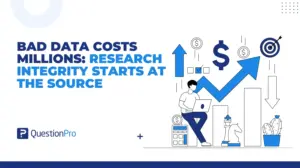
A questionnaire is a set of questions people are asked about a specific topic to gather statistically helpful information. When questionnaires are well-made and given out responsibly, they become essential for making statements about particular groups, individuals, or entire populations.
Questionnaires are often used for quantitative research in marketing and social science. They are an excellent way to get information from many people, often called “respondents.”
Structured Questionnaire is a quantitative research method that Emile Durkheim supported (1858 – 1917). It includes how little the researcher was involved and how many people answered (who answered the questions). It is a positive approach to research.
In this blog, we will discuss what a structured questionnaire is, its types, pros, and cons.
Definition of structured questionnaire
A structured questionnaire is a document used to collect data from respondents and consists of a set of standardized questions with a predetermined framework that sets the precise language and sequence of the questions.
Specifically, worded questions are asked in structured questionnaires. Depending on how they are set up, they can gather a ton of helpful information that provides an in-depth understanding of the thoughts of the vast majority of respondents.
Typically, they are employed for market or social research inquiries. Closed answers are predetermined, rigid, and completely clear. Statements regarding the topic groups can be formed after studying these results and applying them to various existing hypotheses.
These findings can be extended and later used to inform crucial business choices. Results can become muddled due to faulty questions, inappropriate sequencing, or the scales applied.
Types of structured questionnaire
A structured questionnaire can look and be used in many different ways, from population counts to mini-surveys. The primary types of the structured questionnaire are:
- Postal questionnaires: A postal questionnaire is typically used in sociological surveys. These can be closed, meaning respondents usually have a certain number of responses to check. Open-ended questions are used in several questionnaires, particularly attitude surveys. There are certain benefits to using the postal questionnaire.
It is affordable, especially if the sample is sizable or dispersed geographically. Compared to other methods, it can use larger samples.
- Electronic questionnaires: An electronic questionnaire consists of questions a person can respond to using the software.
Examples: A software program on a laptop computer that allows respondents to enter their answers directly (perhaps without the interviewers knowing the specifics of their responses), or through questions on an Internet website.
- Telephonic questionnaires: Telephonic questionnaire surveys are most useful when:
- There is a pressing demand for outcomes.
- The target sample has telephones (not appropriate, for example, in rural parts of developing countries, unless mobile phone usage is widespread)
- Sample participants might struggle to respond to a written questionnaire.
- The survey’s questions are simple to understand and understandable.
- The survey only takes a little amount of time.
- Investigators can make important calls because they have the requisite staff and funding.
- Personally administered questionnaires: A personally administered questionnaire is one that has been created expressly for a responder to complete without the help of the researchers (such as an interviewer) gathering the data.
Although it can be used in conjunction with other data-collecting methods guided by a trained interviewer, a personally delivered questionnaire is typically utilized as a stand-alone questionnaire.
These survey questionnaires provide a variety of questions kinds that can be applied to the investigation.
- Contingency Questions: These questions are related to a previous question.
- Matrix Questions: Questions with the same answer are placed together. This is done so that the respondent can spend less time or page space filling out the survey.
- Closed-Ended Questions: These are yes/no questions. Questions will get either/or answers.
LEARN ABOUT: Structured Question
Pros & cons of structured questionnaire
Like any other survey or questionnaire, a structured questionnaire has advantages and disadvantages. Let’s learn about them:
| Pros | Cons |
|
|
Conclusion
We have talked about and described the structured questionnaire in this blog. What it is, where it is used, how many different types there are, and its pros and cons. This blog post is intended to assist you in determining whether you can use a structured questionnaire in the needed survey or interview.
For handling your data, QuestionPro is a reliable platform. Using the survey software QuestionPro, you can carry out anything from straightforward research to more detailed surveys.
LEARN ABOUT: Data Management Framework
At QuestionPro, we provide researchers with resources for data collection, including our survey software and a database of insights for any lengthy study. To learn more about it, speak with our knowledgeable staff.







